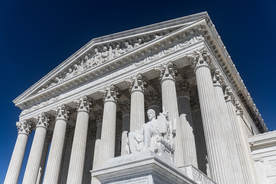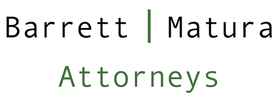 The Arizona State Fire Training Committee is a non-profit organization that organizes and runs the yearly Fire School for firefighters located across Arizona. In 2015, the Department of Economic Security concluded that the instructors who teach at the Fire School are employees of the Committee, rather than independent contractors, and assessed monetary penalties against the Committee. The Department of Economic Security’s decision put the Committee’s ability to run the Fire School at risk, which would have eliminated the primary source of education and training for firefighters. The Committee therefore contacted Jeffrey Matura to appeal the decision. Mr. Matura submitted a written brief and presented evidence and witnesses during a hearing before an Administrative Law Judge. After several months of deliberation, the Administrative Law Judge issued a final decision reversing the Department of Economic Security’s decision in its entirety and adopting every argument that Mr. Matura presented on behalf of the Committee. This decision will enable the Committee to continue the Fire School each year, and is therefore an important ruling for the fire service industry throughout Arizona. Attorney Jeff Matura received a full dismissal of an employment discrimination and breach of contract lawsuit filed against his client. A former employee filed the lawsuit against an Arizona public entity and its board members. The former employee alleged that the public entity violated his federal due process rights, wrongfully terminated him under Arizona’s Employment Protection Act, breached his employment contract, and violated Arizona’s wage laws and open meeting laws. After defending against these claims for less than a year, the former employee agreed to dismiss every claim without receiving any payment, an admission of wrongdoing, or anything else from the public entity and the board members. The result was a complete victory for Mr. Matura’s client and reaffirmed the legal protections afforded to public entities throughout Arizona.
Learn more about Jeff Matura, or contact Jeff at [email protected] Attorneys Jeff Matura and Melissa England received a favorable ruling on behalf of their clients in an historic case in which the United States Department of Justice sought to disband an entire local police department.
Mr. Matura and Ms. England represented an Arizona municipality and its police department. The Department of Justice alleged that the municipality and police department discriminated against individuals due to their religion with respect to police services and housing rights. After more than 5 years of litigation and a seven-week federal jury trial, the Department of Justice requested that the Court disband the entire police department and turnover all policing services to the County Sheriff’s Office. The Court rejected the Department of Justice’s request and instead adopted the remedy that Mr. Matura and Ms. England proposed on behalf of their clients, which included additional training, new policies and procedures, and the hiring of a consultant and mentor to assist the police department. The result was a victory for Mr. Matura and Ms. England’s clients, and also a victory for Arizona municipalities and police departments who fight against government overreach into their local affairs. The Ninth Circuit Court of Appeals, which sets the laws for Arizona and other western states, has unanimously ruled that the United States Department of Justice cannot prosecute medical marijuana patients and suppliers of marijuana for violating federal cannabis laws if those individuals comply with state laws that legalize the use of medical marijuana. The ruling was based upon a 2014 budget measure that Congress passed and which “prohibits the Department of Justice from spending funds” to prosecute individuals who comply with state laws. Currently, 25 states and the District of Columbia have passed laws to legalize medical marijuana, and voters in 9 more states will consider the issue in November 2016.
Although a victory for individuals and businesses involved in the legal marijuana industry, the victory could be short-lived because Congress or the next President could restore funding to allow the Department of Justice to again prosecute anyone who violates federal marijuana laws, regardless of whether they are also complying with state laws. The Department of Justice could also appeal the Ninth Circuit’s decision and request that the United States Supreme Court decide the issue. For now, however, the Ninth Circuit’s decision is a step forward toward establishing legal protections to those who comply with state marijuana laws. READ AN ARTICLE ON THE DECISION FOR ARIZONA LEGAL MARIJUANA.  Attorneys Jeff Matura and Amanda Taylor filed a petition to the United States Supreme Court to request that it enforce the language of the Age Discrimination in Employment Act (“ADEA”). Mr. Matura and Ms. Taylor represent an Arizona public entity. Two former employers filed a lawsuit against this public entity and allege that it wrongfully terminated them due to their age in violation of the ADEA. The federal trial court dismissed their lawsuit and agreed with Mr. Matura and Ms. Taylor that the ADEA does not apply because the public body has less than 20 employees. The Ninth Circuit Court of Appeals reversed the trial court’s decision and held that the 20-employee requirement does not apply to public entities. The Ninth Circuit’s decision is contrary to every other appellate court that has reviewed the issue. Mr. Matura and Ms. Taylor therefore petitioned the United States Supreme Court to request that it reverse the Ninth Circuit and apply the ADEA’s 20-employee requirement to all employers, including public entities. If you have questions about this petition, the ADEA, or other issues involving public entities, please contact Mr. Matura. You can read the full petition here and below.
Attorneys Jeff Matura, Melissa England and Tabitha Myers at Barrett & Matura, PC, in conjunction with attorney Sean Berberian at White Berberian, PC are asking the Arizona Court of Appeals to force state health officials with the Department of Health Services to reduce the amount charged to patients and caregivers who are required to obtain state-issued permits to buy their medicine.
The plaintiffs are two Arizona patients and a caregiver. They argue that the Arizona Medical Marijuana Act requires the State to charge fees only in an amount “sufficient to implement and administer” the state’s medical marijuana program. Instead, the state charges exorbitant fees that have resulted in a surplus of about $25 million. Will Humble, who was Arizona’s health director when the Arizona Medical Marijuana Act became law, has commented in the past that the fee he initially set was based upon a estimation that 25,000 individuals would apply for permits. In reality, more than 140,000 individuals have applied in Arizona. The result is that the state has collected fees far in excess than the amount necessary to implement and administer the program. The plaintiffs are therefore requesting the Court to order the state to reduce the amount of the fees and to return the surplus money to the patients and caregivers in Arizona. Learn more about the Barrett | Matura Cannabis Law Practice Group. Double AA Builders v. Preferred Contractors Ins. Co. – “Subcontractor Exception” Does Not Create More Coverage for Additional Insured
The Arizona Court of Appeals recently confirmed that the “subcontractor exception” of the “your work” exclusion cannot create coverage for an additional insured, particularly when the same provision would bar coverage for the named insured. The “your work” exclusion, standard in a commercial general liability policy, typically bars coverage when the only damage is to the insured’s own “work.” Courts have uniformly recognized that this type of policy is not meant to act as a warranty of the insured’s own work. This exclusion typically includes an exception, however, if the damage arises out of work “performed on your behalf by a subcontractor.” In Double AA Builders v. Preferred Contractors Ins. Co., 241 Ariz. 304, 386 P.2d 1277 (Ariz. App. 2016), the Arizona Court of Appeals addressed, for the first time, whether this exception could create coverage when an additional insured, as opposed to a named insured, is seeking coverage. Double AA Builders was the general contractor for the construction of a Harkins Theatre. It hired Anchor Roofing to install the roof. After the roof leaked and caused damage to the theater, Double AA replaced it and sought indemnity from Anchor as well as its insurer, Preferred Contractors (whose policy named it as an additional insured). Notably, Double AA sought to recover only the cost of replacing the roof. The trial court found that there was an “occurrence” that had resulted in “property damage” during the policy period and that the “subcontractor exception” negated the “your work” exclusion since the work was performed by Double AA’s sub, Anchor Roofing. On appeal, however, the Court held the exception did not apply. Simply put, the “your work” exclusion applies to work performed by the named insured. “You” and “your” are defined to include the named insured and anyone qualifying as a named insured under the policy. Anchor Roofing, the named insured, performed the work. All damage was to the named insured’s work. The subcontractor exception, explained the Court, would only apply if Anchor had used subs to perform this work. Double AA Builders was simply an additional insured. It could not argue that this exception applied because the work was performed by one of its subs. Otherwise, explained the Court, the additional insured would be able to “take advantage of” the subcontractor exception and obtain greater coverage than would be available for the named insured, and interpretation that would “neither be rational nor consistent with the express language of the policy”. This is particularly true since coverage for an additional insured, by nature, is intended to be more limited than that of a named insured and, in many cases, is provided with little or no additional premium. Notably, in Double AA Builders, the additional insured sought coverage only for the cost of replacing the roof itself. In other words, the “your work” exclusion applied in the first place because all damage sought was to the named insured’s own work. This holding does not necessarily impact coverage in other situations, where the work has caused damage to other property and claims are made for that other damage. Further, although the leaking roof had apparently caused additional damage, no claim was made for that additional damage. The trial court still had found an “occurrence” causing “property damage” before addressing the applicability of the exclusion and its exception. Because the Court of Appeals found the “your work” exclusion clearly applied, and the exception did not apply, it did not further address whether the trial court had correctly found an “occurrence” in the first place. Because this case was limited to a situation involving the replacement of faulty work only, it may not have a broad impact on coverage in general. It merely reinforces the general rule that liability policies do not cover the repair of faulty work. However, the Court of Appeals’ decision does confirm the notion that an additional insured is not entitled to any greater coverage under a policy than a named insured, a notion advanced by most insurers although perhaps never expressly articulated by the Courts. This general principle may ultimately assist carriers in making similar arguments in other types of situations involving additional insureds and the scope of coverage available under a general liability policy. Learn more about the Barrett | Matura Insurance Litigation and Coverage Practice Group. Contact Jennifer Bahling or Kevin Barrett for more information. On January 4, 2018, United States Attorney General Jeff Sessions reversed the government’s long-standing policy regarding the enforcement of federal drug laws in states that have passed laws to protect marijuana businesses and users. In 2013, the Obama Administration adopted a policy known as the Cole Memorandum, which directed federal prosecutors to use discretion in prioritizing and prosecuting violations related to marijuana in states that had passed laws to protect its sale and use for medical and recreational purposes. This policy indicated that the federal government would respect state marijuana laws if certain conditions were satisfied - such as keeping marijuana away from criminal gangs and out of the hands of children. Attorney General Jeff Sessions reversed this policy and stated that each United States Attorney in each individual state should decide whether they will prosecute businesses and individuals who buy, sell, or use marijuana pursuant to state law. The result is that the government’s view on state marijuana laws could vary from state-to-state. It also means that businesses and users who comply with state marijuana laws are no longer shielded from prosecution by the federal government because marijuana remains illegal under federal law and is classified as a Schedule I drug by the federal Controlled Substances Act.
Despite the new direction from Attorney General Jeff Sessions, some limited protections do still exist, including under the Rohrabacher-Blumenauer Amendment, which limits the government’s use of certain funds to prosecute individuals who are complying with state marijuana laws. If you have questions about compliance with state and federal marijuana laws, call Jeff Matura or Melissa England at 602-792-5705. Learn more about the Barrett | Matura Cannabis Law Practice Group.  Kevin Barrett and Jeff Matura announced the opening of their new law firm, Barrett | Matura. Joining Kevin Barrett and Jeff Matura are attorneys Jennifer Bahling, Melissa England, Amanda Taylor, and Tabitha Myers. Barrett | Matura is a full-service law firm that represents clients in Arizona, Nevada, and California in a broad range of legal areas, including business disputes, insurance coverage and bad faith litigation, municipal and governmental issues, medical and recreational cannabis law, employment disputes, and real estate transactions. |
Archives
November 2020
Categories
|
||||||
Arizona | Nevada | California
|
©2018 BARRETT | MATURA
ALL RIGHTS RESERVED. |

 RSS Feed
RSS Feed